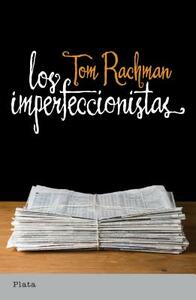Take a photo of a barcode or cover
An interesting book with interesting characters, many of whom are incredibly cynical. This novel represents a sad reality about an industry hit very hard by technological advancements. Those advancements increasingly seem to have an adverse effect on the industry's integrity, which the book also seems question. I particularly like Rachman's character development, which is particularly effective given the brief space he devotes to each character's story. I also like the way Rachman weaves some characters into other characters' stories, in a peripheral, yet substantial role.
I also really like the frame story which fills in a lot of the narrative holes that would otherwise leave the reader a bit confused.
Although I really enjoyed the book, I was left feeling a bit of melancholy, but I'm also not convinced that this is a bad thing.
I also really like the frame story which fills in a lot of the narrative holes that would otherwise leave the reader a bit confused.
Although I really enjoyed the book, I was left feeling a bit of melancholy, but I'm also not convinced that this is a bad thing.
This novel in stories about an English-language paper in Rome was so beautifully put together. I was surprisingly gripped and found myself lost in each new character (or not necessarily new, as the stories do interlink). Some of the sections were disturbing, and yet, I can't stop thinking about them. Enjoyed this much more than I expected to.
I absolutely loved the book. The idea of sort of interconnected people in these individualized stories was amazing. I found it to be a refreshingly easy book. The interludes about the Ott Family were stupendous. I think they really had a connection about them.
I have never worked at a newspaper, but I find the speed at which these people exist to be fascinating.
But, as a dog owner and lover, I thought the last ending was garbage.
I have never worked at a newspaper, but I find the speed at which these people exist to be fascinating.
But, as a dog owner and lover, I thought the last ending was garbage.
I read this book in an afternoon, in between putting coats of paint on my door. It was that fun of a read. This book is the story of an international paper, based in Rome, which is going slowly defunct. Each chapter is a glimpse into the life of a different staffer, and they are split up by the backstory of the history of the paper. I really enjoyed all the stories, and the difference between how a character is perceived versus how they see themselves was well done and maintained in the narrative as a whole. There were characters that I hated, ones who drove me crazy, ones who were sad, and ones who I liked a lot, but they were all interesting to read about.
lighthearted
slow-paced
Plot or Character Driven:
Character
Strong character development:
No
Loveable characters:
No
Diverse cast of characters:
No
Flaws of characters a main focus:
Yes
Graphic: Animal death
Moderate: Animal death, Body shaming, Bullying, Cancer, Death, Emotional abuse, Misogyny, Toxic relationship, Grief, Stalking, Death of parent, Gaslighting, Toxic friendship, Sexual harassment
emotional
reflective
sad
medium-paced
Plot or Character Driven:
Character
Strong character development:
Yes
Loveable characters:
Complicated
Diverse cast of characters:
Yes
Flaws of characters a main focus:
Yes
Each chapter is about a different person that is in some way related related to an English language newspaper based in Rome. For almost every character, that one chapter contains a nugget of truth about the person so that you get a good idea of what the person would be like from just a few pages. Very readable, well-written. Didn't love the ending - seemed like an afterthought - but on the whole a good book.
I really enjoyed this book. Someone commented to me that no one in it was happy, but that didn't bother me. The characters get more intertwined and more surprising as the book goes on. Highly recommended for fun, light read!
Great character studies against the backdrop of the international paper. It's damn funny and on the mark as far as quirky newsrooms go (and I suspect all newsrooms fall into this category).
From the chapter featuring the old corrections editor:
Herman stands before the copydesk, torch-eyes passing over the three editors on duty. They halt mid-keystroke. "And I haven't even accused anyone yet," he says darkly, opening that morning's paper as if it contained a murder weapon. What it does contain is worse: a mistake. He touches the error with contempt, pokes at the despicable word, as if to shove it off the page and into a different publication altogether. "GWOT," he says. He slaps the page, shakes it at them. "GWOT!"
"G what?"
"GWOT!" he repeats. "GWOT is not in the Bible. And yet it is here!" He jabs the article, driving a sausage finger through page three.
... [Herman is typing a new entry, No. 18,238, for the Bible, the paper's style guide...here's what it says:]
Normally it stands for Global War on Terror. But since conflict against an abstraction is, to be polite, tough to execute, the term should be understood as marketing gibberish. Our reporters adore this sort of humbug; it is the copy editor's job to exclude it.
Lots of great newspaper humor and insights.
From the chapter featuring the old corrections editor:
Herman stands before the copydesk, torch-eyes passing over the three editors on duty. They halt mid-keystroke. "And I haven't even accused anyone yet," he says darkly, opening that morning's paper as if it contained a murder weapon. What it does contain is worse: a mistake. He touches the error with contempt, pokes at the despicable word, as if to shove it off the page and into a different publication altogether. "GWOT," he says. He slaps the page, shakes it at them. "GWOT!"
"G what?"
"GWOT!" he repeats. "GWOT is not in the Bible. And yet it is here!" He jabs the article, driving a sausage finger through page three.
... [Herman is typing a new entry, No. 18,238, for the Bible, the paper's style guide...here's what it says:]
Normally it stands for Global War on Terror. But since conflict against an abstraction is, to be polite, tough to execute, the term should be understood as marketing gibberish. Our reporters adore this sort of humbug; it is the copy editor's job to exclude it.
Lots of great newspaper humor and insights.
Like Olive Kitteridge, this one reads like a series of connected short stories (each chapter has a gut-punch often found in short stories) but the connections are more obvious and frequent, and they don't center on one character. The main character is the unnamed international English-language newspaper referred to as "the paper." The writing is refreshingly concise and journalistic, fittingly. The characters are all too believable in their screwed-up craziness. There's an effective use of the Rome setting. The ending is softer and more forgiving of the characters than you might expect after reading their somewhat disturbing backgrounds.





